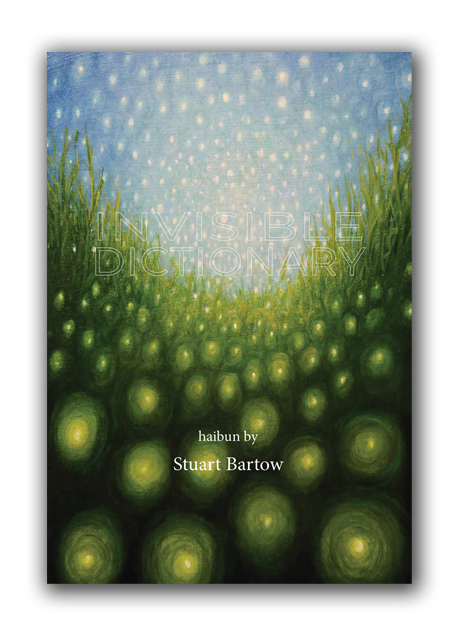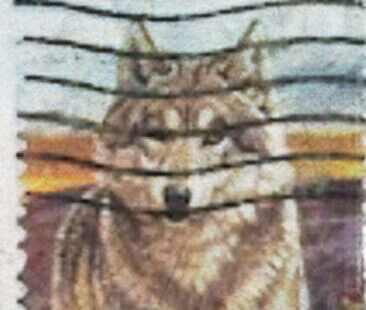
Book Review: Invisible Dictionary
By Stuart Bartow
Published by Red Moon Press
2022, paperback, unpaginated
ISBN: 978-1-947271-90-6
$20.00 US
Ordering Information
Reviewed by Glenn G. Coats

Readers of contemporary haiku and haibun are no doubt aware of Stuart Bartow. A teacher of writing and literature at SUNY Adirondack, he has found a home for his work in many haikai journals, and his several books include One Branch, which made the shortlist of the Haiku Foundation’s 2019 Touchstone Distinguished Books Award.
His latest book is Invisible Dictionary, a collection of 56 haibun (including several from One Branch). The title signifies a theme—things we can’t always put a finger on or easily name: the still unknown language of carpenter ants, the name for a poem spoken then lost in the wind. Bartow ponders phenomena not yet considered (does a quaking marsh dream?) and poses questions without answers (do ghosts have a place to go after the house they haunt is gone?). Such questions run through the book, adding new dimensions to his work and perhaps begging us to look inward for answers.
The book’s title piece is a good place to start. It’s written in free verse, and in it Bartow wonders what the constellations might be called if no one had connected lines between stars.
What would they mean to me
had they no names,
had no one limned their shapes,
the winter constellations, the Milky Way?
Would they take on other forms,
clasp other names?
One summer afternoon
in a barn loft, all the knotholes
in the warped wood leaked light
like stars, a sky negative. Sometimes
I can see Andromeda
with her bracelet
of millions of stars, more millions
of words if we could name them.
The haibun closes with one of the loveliest haiku in the collection.
at first the evening star then all at once everyone else
In Bartow’s hands, questions truly are poetic devices that add new dimensions. “Translation” offers another fine example. The title brings to mind language, perhaps translating a poem into another language, while the prose as well as the haiku describe things that may never be quite understood. I was reminded of a failed experiment that I conducted as a child: Believing that my fancy guppies and sword tails communicated., I carefully wrapped my sister’s tape recorder in plastic then allowed it to sink in the aquarium. No sounds were detected and the tape player never worked again. For Stuart, the focus is carpenter ants rather than fish, but the question is the same.
Translation
Carpenter ants like to excavate their nests in trees, but sometimes they nest in walls and, at night, you might hear them rustling like aluminum foil being crumpled. Finding no other function for the sound, entomologists theorize the ants are communicating. Could they be chattering, singing, or chanting?
radio waves
who to unscramble the songs
we send into space
Bartow deals with a wide range of subjects—he is a fan of both fishing and science fiction, as well of as hiking and gardening—and he writes with a broad mix of humor and tenderness. “Migration,” for example, describes the passing of a sister who died of an overdose. The haiku details a wobbly V of geese that seem to be off course. I am left to think of others that I have known who stumbled off course and could not find a road back home.
Migration
My sister’s body, overdosed on heroin, had been found in an abandoned house. A couple days after the funeral I was driving my 15-year-old niece to her friend’s house when she asked if I thought her mother would go to hell. No, I replied, she’ll go to heaven, but she’ll have to stand in line for a long time.
a wobbly V of geese
flying
in the wrong direction
At times, Bartow’s writing reflects the careful observations a naturalist. (In addition to his work as a teacher, he chairs the Battenkill Conservancy, an environmental group working along the New York–Vermont border.) In “La Vida Loca”—Spanish for “the crazy life”—the two detailed paragraphs tell of the author’s fascination with darning needles (dragonflies). “They feed on small insects, including black flies and mosquitoes, and are active all day, sleeping on lily pads or logs and fallen trees in the lake.” Stuart imagines that aliens would find them more beautiful than humans.
Aliens return in “Rescue Mission,” where media overload causes a lack of interest in UFO sightings. Bartow wonders if aliens are observing us, wanting to see if we can save ourselves from ourselves. I think of the war in Ukraine, the effects of climate change, and racial violence. Is the “Rescue Mission” stated in the title a referral to our ability to save humanity? The capping haiku returns us back to Earth.
trying to get close enough the checkerspot's face
The poet Frances Angela once wrote that “a poem requires a reader to exist and for meaning to be made,” and how when she reads someone’s else’s poetry it “widens my inner landscape.” I find that in Bartow’s haibun: they stretch my thinking beyond the here and now. In “Fable,” for example, the author compares a hunter who pursues a white stag to that of Melville’s quest for Moby Dick, and the imagination to the ocean where beings like the white deer and whale arise. The haiku, like so much of the work found here, urges the reader to see things in a different light, from an angle not considered before.
quaking marsh who is dreaming whom
The questions that run through Invisible Dictionary are reason alone to read this new collection—and to read it over again. I savor the surprises, twists, and insights they contain. Invisible Dictionary reaffirms my love of haibun.
Note: The quote by Frances Angela appeared in a short essay found in Presence #34.
About the Reviewer

Glenn G. Coats lives with his wife, Joani, in Carolina Shores, North Carolina. His books include two recent collections of haibun, A Synonym for Gone (Snapshot Press, 2021) and Degrees of Acquaintance (Snapshot Press, 2019), and Furrows of Snow (Turtle Light Press, 2019), which won an honorable mention in the Haiku Society of America’s 2020 Merit Book Awards.

Glenn. Thanks so much for your review! Stu
My mum (Sherry) bought this book at Haiku Circle when she did her concert tour in USA this year and she is now making me read it! I am learning how to edit my own short form journals and write book reviews.